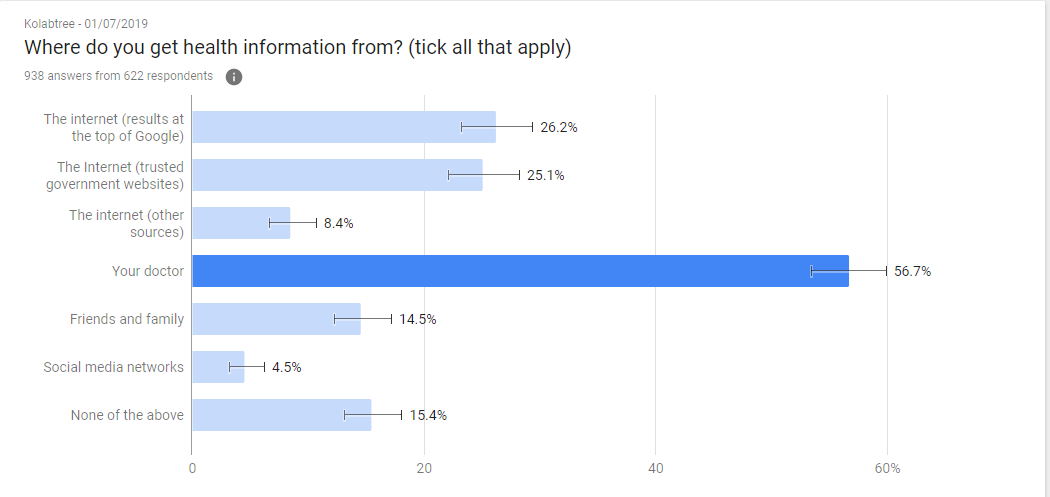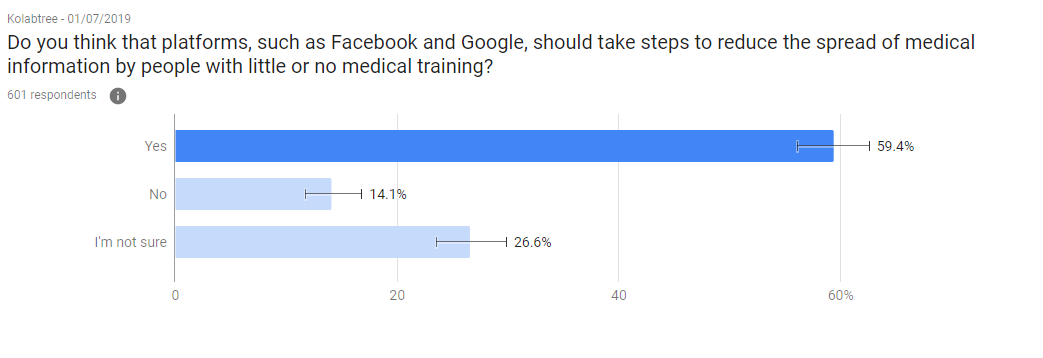Have you ever Googled your symptoms online? Most of us have. The public’s over-reliance on the internet to discover health-related information is a frequent cause for concern. Here’s google vs doctor on healthcare news.
As early as 2016, a study appeared in JAMA Internal Medicine that focused on the accuracy of diagnosis online and offline. Forbes covered the results and as expected, doctors came out on top with better accuracy than generic symptom checkers.
The researchers argued doctors have superior knowledge, because of their rigorous training and all-important access to patient history. Both allow health professionals to make informed decisions, rather than a generic assumption about health.
A symptom checker is limited, as it can only provide the most common causes, related conditions and suggested treatments. Blanket answers online often lead to misdiagnosis as people can misinterpret the information. Readers could leap to a dramatic conclusion, fearing the worst possible case scenario. Receiving non-personalised information could also persuade people to ignore a serious health condition.
This piece of research was of high importance as it should have made people aware of how ineffective looking for health symptoms online can be. But did it make any difference? Do we still frantically type in our health-related worries into Google before making an appointment with our GP? Our latest survey finds out.
Know how Google vs Doctor affects the health information online:
The conversation so far
After the 2016 study, the topic of symptom checking was covered by The Citizen, in an anecdotal article on why “Dr Google” is a doctor’s worst enemy stating google vs doctor comparison. Why? As the text reveals, patients are beginning to question a doctor’s authority and expertise when their diagnosis or advice doesn’t match that of online information. WebMD is the online source mentioned — a domain constantly criticised for providing false information to readers. Vox even went as far to say the site is a “hypochondriac’s nightmare” in their commentary. google vs doctor
Of course, not every article touching on the topic is directly slating online content. Not many people can deny Googling symptoms to get an instant diagnosis is something they’ve done in the past. Especially if you’re part of the 28% of people who find getting a GP appointment “not very easy”. Many Brits are dissatisfied with how difficult it is to speak to a GP. The slim opening hours offered by surgeries are another cause for concern. It’s fair to say, these reasons could fuel internet searches for health-related information. After all, platforms such as Google and Facebook are accessible 24-hours per day.
The Guardian says this frequent act is “always a perfect imbalance”. As much as using search engines to get answers about your health could be harmful, it’s also a sign patients don’t feel listened to. The author of the article, Richard Vize — the editor of Health Service Journal — closes by saying “this is not a route to longer consultations and wasted time, but a strategy for improving outcomes and helping patients to be engaged in their own care.”
A lot has changed since these initial articles were written, including Amazon’s partnership with the NHS. Patients can now ask internet-powered Amazon Alexa health-related questions and receive NHS-approved answers through its voice.
The NHS believes this practice will give people “better control of their healthcare” — because they can quickly receive advice on topics such as how to treat a migraine. This news didn’t come without a stampede of criticism. Just take a look at the altogether negative user comment in this announcement article.
If healthcare services had infinite resources, we’d all agree that in-person, expert advice is the ideal alternative. As a scientific freelance platform, we believe research projects and online content greatly benefit from the insights gained through collaboration with qualified practitioners. The real question is, how does the ease of using Google influence many of us? And are new developments like the NHS integration in Amazon’s Alexa really making it easier for us to avoid seeing a doctor?
Where do you get your health information from?
To get a definitive answer to our question, we asked: “where do you get your health information from?” Thankfully, most people (56.7%) said their doctor was a chosen source of information.
26.2% of the public favour the results at the top of Google — those sites deemed worthy of high visibility after Google’s Medic update, which cracked down on health-related content. A smaller portion of people (25.1%) uses the internet with more restraint, taking advice only from trusted government websites. An even lower proportion (8.4%), selected the answer “The Internet (other sources)”. Only 4.5% claimed social media networks were their go-to source for medical advice.

A minority (14.5%) say they speak to friends and family about health issues, while 15.4% of people chose the answer “None of the above”. Perhaps this portion of people represents those who are starting to make use of applications such as Amazon Alexa’s NHS health integration.
It seems the legitimacy of professional practices still influences most people to visit their local GP. However, when you break down the results, it appears more people are scouring different corners of the internet to find solutions. The final result? Slightly more people (64.2%) are using the internet to read up on health-related queries versus those visiting the doctor (56.7%), but it’s a close call with no real “winners” in this round.
It’s important to note that people could vote for more than one source of information. For example, they could select both visiting the doctor and using Google to get information. The average number of options chosen was 1.5, meaning most people use more than one method to check health content.
These results become even more interesting when we use sub-filters such as gender or age. For example, 60% of women get health information from their doctor — as opposed to 53.4% of men. It’s also women who trust government websites more and men who are more likely to go for sites that rank well.
Does this mean men are more prone to receiving misinformation than women? It could be this is more of a generational trend, as older generations tend to get medical advice from their doctors, while young people tend to go to Google.
Do you think that platforms, such as Facebook and Google, should take steps to reduce the spread of medical information by people with little or no medical training?
Just because people use online platforms to find information doesn’t mean they think they’re doing a great job — right? Our next question attempts to uncover how the same audience perceives the responsibility of the platforms they frequently rely on.
It seems the conversation around online misinformation has impacted on people’s beliefs about monitoring medical information online. A whopping 59.4% of people think the named platforms should be active in reducing the impact of content written by non-experts.

The lowest portion of respondents (14.1%) selected “no”, indicating platforms shouldn’t take steps to reduce the spread of non-expert medical information. A slightly larger segment (26.6%) said they weren’t sure about the matter.
In this question, it seems once again that men and younger people are more susceptible to receiving false information online. 61.9% of women, as opposed to 56.8% of men, believed platforms should take more steps to prevent the spread of inaccurate medical information. Generally speaking, the older the participants got, the more they were in favour of monitoring medical information. Only 61.2% of 18-24-year-olds answered “yes” to this question, compared to 73.5% of people aged 65+.
When you feel ill or experience unusual symptoms, what do you do first?
Both the internet and doctors are neck and neck when it comes to where people find information related to their health. Discovering people’s favoured information source could take us one step closer to understanding the real battle between Google and health experts. In short, we wanted to find out which source those who used several sources checked first?
Could it be people use Google and internet searches as a preliminary check before ultimately going to visit the doctor? Or perhaps health issues that appear out-of-hours are first checked online to assess the severity of the situation?
Interestingly, the results suggested the opposite. The majority of respondents (56.8%) said the first action they would take is to call their GP. The remaining audience (43.2%) said they would Google their symptoms. Again, these statistics are fairly level, dismissing our initial speculations about Google acting as a preparation tactic.
 As with the other questions, we filtered further by gender and age to gain better insight.
As with the other questions, we filtered further by gender and age to gain better insight.
Women are more likely to Google their symptoms first (50.9%) than to call their GP (49.1%). If we compare this to men, they report calling their GP first 64.7% of the time and Googling their symptoms first only 35.3% of the time.
Younger generations are much more likely to Google first. 56.7% of 18-24-year-olds take to Google first, compared to 43.3% who say they call their GP. We can compare this to the age group 65+, who say they Google their symptoms first only 19.2% of the time. The rest — 80.8% —initially call their GP. These results demonstrate a generational divide — younger people trust information online and have come to rely on it.
Have you ever misdiagnosed yourself after reading medical content online?
Our final question attempts to uncover just how unsafe and ineffective online diagnosis can be. Previous research has already shown a doctor’s diagnosis to be superior when compared with online symptom checkers. With so many people still choosing to check online content at some stage, we wanted to know how often this resulted in misdiagnosis.

It appears the majority of people (73.1%) haven’t misdiagnosed themselves after reading medical content online. Only 26.9% of respondents answered yes.
However, the study’s entire audience answered this question — including those who admit to avoiding online content. While the unfiltered answer suggests less than 30% of people misdiagnose because of online information, the results change quite dramatically when we filter them by age.
Throughout the study, younger respondents have shown their favour towards online content. Within this question, almost half (44.1%) of 18-24-year-olds have misdiagnosed themselves online. Those aged 65+ — those who admit to avoiding online content when it comes to health — present a stark contrast. Only 10.6% of this age group think they have experienced misdiagnosis after reading online content. This data suggests misdiagnosis online is common in those who regularly turn to internet sources for health-related information.
This topic has already influenced major changes in online platforms such as Facebook. As recently as July, Facebook announced they would de prioritising posts with sensational health news to combat misinformation online.
This change follows public criticism of Facebook content — specifically from users who have seen alternative cancer therapies and speculation on vaccine side-effects on their news feeds. The new Facebook update won’t remove similar content. Instead, users will be less likely to see non-expert health content at the top of their feeds. Products that make bold health claims — such as weight loss pills — will also be de-ranked by Facebook.
Search engines have also begun to make adjustments regarding health-related content. Although Google hasn’t confirmed any of their latest algorithm changes targeted health-related websites, many search experts suspect it was. Google’s August 2018 update was coined the Medic update because of its supposed focus on health content. It seems — in a similar approach to Facebook — that Google is monitoring quality factors to decide which medical content should be most visible online.
As Google is a search engine — not the owner of the internet — they will not be responsible for permanently removing content online. However, they can determine how different websites and pages perform in searches. So, post-Google Medic, users will be less likely to see non-expert health information on the first page of Google search results. This summarizes Google vs doctor outcomes.







